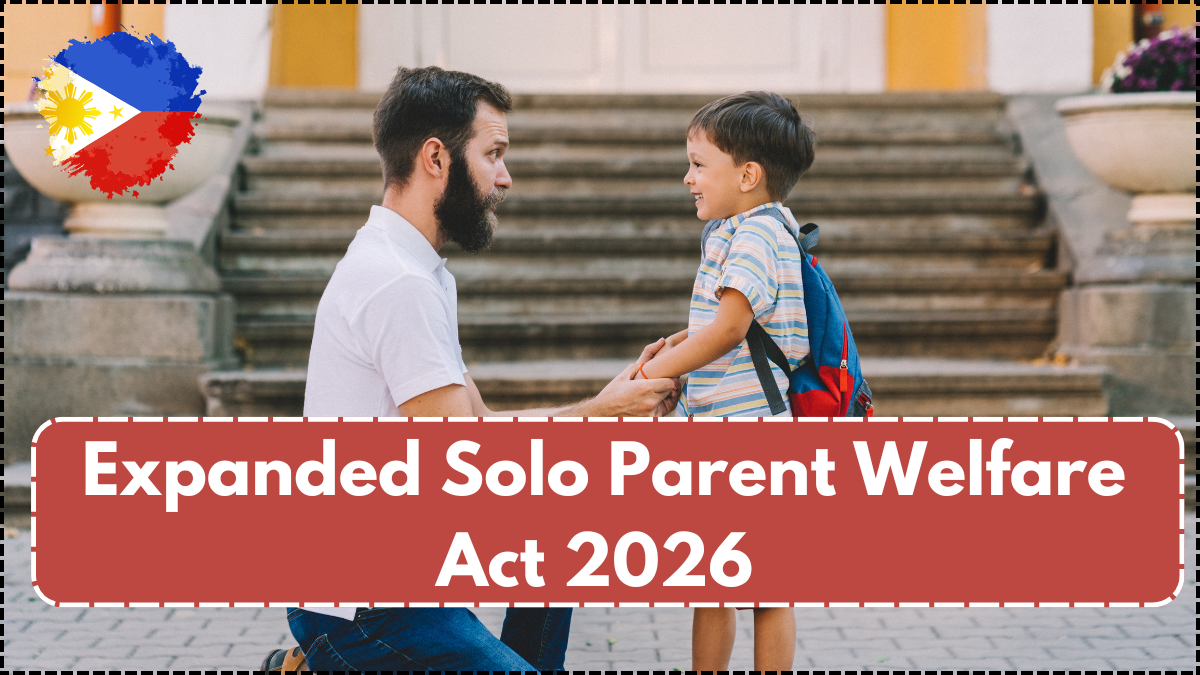The Expanded Solo Parent Welfare Act 2026 marks a major legislative shift in the Philippines, enhancing the government’s commitment to support solo parents. Enacted to respond to rising economic and social pressures, this law introduces broader benefits and revised qualifications. As of July 2025, solo parents in the Philippines can expect more inclusive access to services and financial support, reflecting the administration’s effort to create a stronger safety net.
The law updates and strengthens Republic Act No. 11861, which previously governed solo parent benefits. The amendments emphasize more equitable assistance, especially for those living below the poverty line or balancing childcare with employment.

Table of Contents
Key Features of the Expanded Solo Parent Welfare Act 2026
Here’s a breakdown of the critical improvements:
Feature |
Details |
|---|---|
Monthly Cash Aid |
₱3,000 for low-income solo parents, disbursed via DSWD |
Priority in Government Services |
Health, education, and housing services prioritize solo parents |
Flexible Work Arrangements |
Employers must provide options such as WFH or flexible hours |
Scholarship Grants |
Available for one child of qualified solo parents |
7-Day Parental Leave |
Additional leave exclusive to solo parents |
These upgrades go beyond financial relief—they aim to protect the mental health, time, and rights of solo parents juggling multiple roles.
Updated Eligibility Requirements for 2026
The scope of who qualifies as a solo parent has been expanded. The 2026 version of the law clarifies and widens eligibility to cover more Filipino families. As of July 2025, individuals who qualify include:
- Unmarried mothers or fathers raising children alone
- Legal guardians assuming full parental duties
- Spouses of detained, incapacitated, or overseas workers for at least a year
- Separated or divorced parents with legal custody
These updates are crucial, especially in urban centers where many parents handle child-rearing responsibilities on their own due to migration or economic circumstances. To access new support and solo parent benefits PH 2026, applicants must register with the Solo Parent Office or through the DSWD online portal.
The Impact of Monthly Cash Aid on Solo Parent Households
One of the most notable additions under the Expanded Solo Parent Welfare Act 2026 is the monthly ₱3,000 cash aid for low-income solo parents. This aims to cushion financial stress, especially for households with children below 18 years old. The fund is directly sourced from the DSWD’s social protection budget and distributed through local government units.
This monthly support can be used for daily expenses like food, utilities, school fees, and transportation. In surveys conducted in early 2025, solo parents reported that regular cash assistance significantly improves their ability to manage both work and family duties.
How Employers and Institutions Must Adapt
The law doesn’t just focus on aid—it mandates structural changes too. Employers are now obligated to create parent-friendly policies. Solo parents must be given:
- Flexible working hours or remote work options
- Protection from discrimination in hiring and promotion
- Seven additional parental leave days, separate from existing benefits
Educational and healthcare institutions are also required to prioritize solo parents and their children in programs and admissions. This holistic approach ensures that solo parenting does not translate into lost opportunities for either the parent or the child.
Conclusion: A Law Built for Real-Life Struggles
The Expanded Solo Parent Welfare Act 2026 is more than just a law—it’s a recognition of the everyday battles faced by solo parents across the Philippines. As of July 2025, it represents a firm step toward inclusive welfare, leveling the playing field and restoring dignity to single-headed families.
Solo parents are no longer just surviving—they’re seen, supported, and prioritized. While implementation will require cooperation across agencies, this Act is a powerful signal of progress.
FAQs
Who qualifies as a solo parent under the Expanded Solo Parent Welfare Act 2026?
Anyone solely responsible for raising a child due to separation, death of a partner, legal custody, or abandonment, including guardians and long-term OFW spouses.
How can I apply for solo parent benefits PH 2026?
You can register through your local Solo Parent Office or submit documents online via the DSWD’s digital platform.
What documents are required to claim new support benefits?
Typically, you’ll need a valid Solo Parent ID, proof of income, child’s birth certificate, and supporting legal documents such as separation papers or custody rulings.
Is the ₱3,000 monthly cash aid available to all solo parents?
No. Only those classified as low-income and who meet the qualifications set by the DSWD are eligible for this financial support.
Can employers refuse flexible work arrangements for solo parents?
No. Under the new law, employers are mandated to accommodate reasonable flexible work requests from qualified solo parents unless it causes undue hardship to business operations.
Click here to learn more




